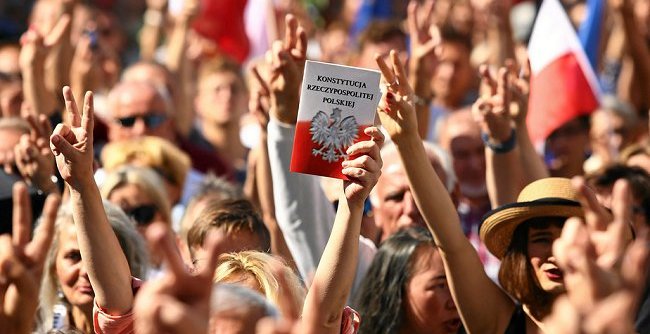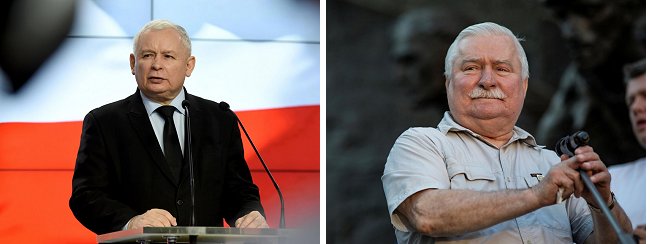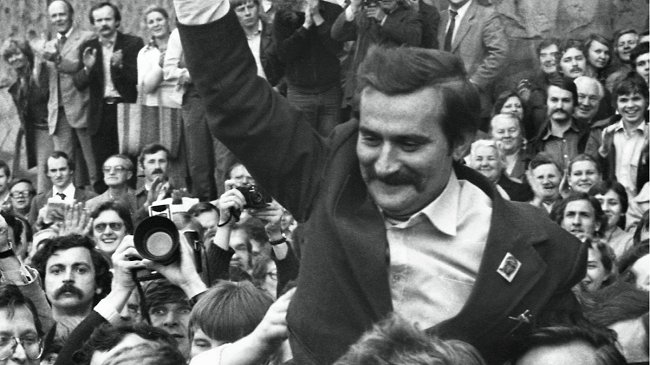| Thirty years after arrival
of democracy, Poland's facing deep divisions
In the summer of 1989, Poles united
under the Solidarity movement (Solidarność) achieved a crucial democratic
breakthrough by obtaining the hold of elections from the communist regime.
Thirty years after, noted our contributor, a fratricidal conflict is tearing
apart the great trade union, an illustration of a country torn between
nationalist and pro-European camps.
Gdansk - It was in September 1980.
The Solidarity trade union was just born and Anna Maria Mydlarska, a young
witness from the beginning, was not even close to imagine the scope of
the event: a month later, no less than 10 million of Poles joined to the
movement which would hasten the fall of communism.

"There was an infectious enthusiasm
in the society", said the film-maker who became the interpreter of Lech
Wałęsa, a living icon of the movement. "It was more than a simple trade
union: the intellectuals, professors and students, members of Sciences
Academy... The dissidence was everywhere, it was amazing."
Through the window of her office
in the European Solidarity Centre - a separate organization from the Solidarity
trade union - we can see the rusted crane of the famous shipyards of Gdańsk.
It is in this port city, bordered by the Baltic Sea, that was born the
first independent trade union of the communist bloc, which became the engine
of a unified civil society around the same objective: to get rid of autocracy.
The triumph came in 1989. On June
4th of that year, a rare democratic opening happened, while the regime
of the general Wojciech Jaruzelski authorized the first partially-free
elections in the country. Enough do provoke a craze in the rest of the
bursting Eastern bloc, on the verge of bursting. Six month later, on November
9, the Berlin Wall was falling.
Fratricidal Battle
On the floor below, still in the
European Solidarity Centre, Lech Wałęsa, who is now 75, has not lost his
shape. Neither his mustache. Backed by a portrait of Pope John Paul II
and surrounded by European and Polish flags, the central figure of the
80's movement regrets nothing. "My role was to bring freedom to society",
said the trained electrician who became President of the republic in 1990.
"And that is what I did: it allowed to erase borders in Europe."
On his shirt, the word "Konstytucja"
(Constitution in polish) is written, a way for him to oppose the power
currently in place in Warsaw "even in my dressing style". In an open conflict
with the ruling party Law in Justice (PiS), headed by Jarosław Kaczyński
since 2015, Lech Wałęsa is portrayed by the government as a true enemy,
accused of having been an "agent" of the communist power.
Today, a fratricidal battle opposes
the two man, like a country mainly torn between nationalist and liberal
pro-European camps. On one hand, there are supporters of the PiS, an ultraconservative
party accused of breaking the rule of law and enforce historical revisionism.
On the other, opposition circles are criticized to be disconnected from
the grass-root people.
'He is a dishonest man", said M.
Wałęsa, referring to Jarosław Kaczyński, himself a former member of the
Solidarity movement. "He can't position himself politically than with populism
and demagoguery, it's his tactic to stay in power."
"Betrayal" of the elites
Two streets further, at the Solidarity
union headquarters, a now PiS-controlled institution, opinions differ.
"We do have a lot of reasons to be satisfied with the policies of the current
government", said Bogdan Olszewski, secretary of the Gdańsk region, praising
the social aids that the PiS has established since 2015.
For the elected PiS deputy and former
president of the trade union Janusz Śniadek, "It is the workers and old
members of Solidarity that lost during the transition". He said that a
certain feeling of betrayal toward liberal elites" persists in the country.
"Wałęsa tells that he defeated communism alone, but he never thanked the
other members of the movement", said Mr. Śniadek.
Marcin Darmas thinks the same. For
this conservative sociologist at the Warsaw University, the social divides
could be explained in part by the 1989 round table agreements, which resulted
in a regime transition. According to him, the "excluded" of the transition
would now see the PiS as their main moral support. "The great figures of
the movement were the privileged ones. But for others, justice has not
been done."
"The political climate in Poland
is toxic", said the Vice mayor of Gdańsk, Piotr Grzelak. Last January,
at a charity event in this peaceful city of one million people, the mayor
of the time Paweł Adamowicz was murdered by an unbalanced man. For Mr.
Grzelak, there is no doubt that "the level of discussion reached a point
where people, whether crazy or not, come to the idea of killing someone
for political reasons".
The current climate is even tearing
families apart, says the politician of the opposition. "Today, at table,
people avoid political discussions. It is up to both sides to ease tensions
in this context."

Authoritarian slide?
The political transformation for
30 years has been imperfect, admits for his part the journalist Konstanty
Gebert. "But during that time, the communists did not intend to negotiate
their own end. That's what started an irreversible transition to democracy",
he said.
However, 30 years later, this atmosphere
of unity has disappeared. "What is very disturbing is that this division
in Poland is deep and binary."
And he thinks that the PiS has his
share of responsibility in this context by claiming a certain "monopoly"
of the values and the popular representation. "Thus, the PiS creates a
division that has existed neither in the last 30 years of democracy nor
under the communist regime" regrets this former influential member of the
union, who participated in the negotiations of the round table.
In the wake of the parliamentary
elections to be held in autumn, he fears that an "illiberal" democracy
will emerge in Poland, like in Hungary. With a 45% score in the European
elections last May, the PiS is heading for another victory, he redoubts.
"If they get the constitutional majority, it's the end of the democratic
game."

The road toward democracy
1980 After many strikes in
front of the shipyards of Gdansk, the workers obtain the right to gather
together behind the Solidarity trade union, with Lech Wałęsa as the leader.
1981 Driven by Moscow, the
martial law is implanted in Poland. The repression goes again. Many of
Solidarity members are imprisoned, but the movement keep operating in the
clandestinity.
1989 Around the famous round
table, communists and representatives of Solidarity negotiate a peaceful
democratic transition. In June, Solidarity won the first semi-democratic
parliamentary elections, five months before the fall of the Berlin Wall.
1990 Lech Wałęsa is elected
President of the Republic and abandons the Presidency of Solidarity.
Patrice Senécal
This text is a translation of
a story originally published in La Presse, on August 10th, 2019 (Pologne:
trente ans apres la démocratie, la division).

Patrice Senécal - is a young
free-lance journalist who contribute occasionally to some Quebec newspapers
and Le Courrier d'Europe centrale, a French portail that covers Central
Europe. Currently learning Polish and Spanish, curious by nature, he loves
to search and tell stories that that goes beyond the news. He currently
study in a political science program at Université de Montréal.
|